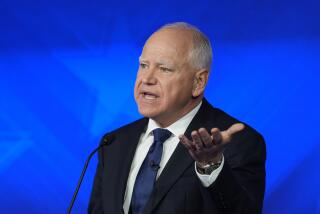Activist Hopes to Return to China
- Share via
HONG KONG — After being permitted to enter Hong Kong, a prominent former Chinese student protest leader who helped organize the pro-democracy demonstrations in Beijing’s Tiananmen Square nearly 15 years ago said Wednesday that he still hoped to be allowed to return to the mainland someday.
“I have to have that hope -- that one day we will come home,” said Wuer Kaixi, whose name was once the second on a list of 21 most-wanted student leaders of the Tiananmen protests.
He escaped China via Hong Kong after the 1989 Tiananmen Square massacre, in which hundreds of protesters were killed by People’s Liberation Army troops. After spending several years in Europe and the U.S., Wuer, an ethnic Uighur, settled in Taiwan about six years ago.
He has since married a Taiwanese woman and become a Taiwanese citizen, and is now a political commentator in Taipei, concentrating on less controversial domestic issues.
Speaking Wednesday at a lunch at the Foreign Correspondents Club of Hong Kong, Wuer clearly pinned his hopes for political change not on internally driven reform, but on influences from outside China, which are gradually increasing as the country’s economic transformation links it more closely to the rest of the world.
“The world needs to tell China that in order to protect [foreign] investment, there needs to be an equal-opportunity society -- that will help us,” he said.
The decision by Hong Kong authorities to issue Wuer a visa was widely seen as a surprise, motivated in part by the nature of his request -- to attend the funeral of Cantonese pop singer Anita Mui, who had been a close friend and fellow democracy advocate.
With neither protests nor prominent mainland visitors scheduled in the territory and the political atmosphere quiet on the eve of the Chinese Lunar New Year holiday, the government appeared ready to take a chance on Wuer.
Department of Immigration spokesman K.K. Au said his office did not comment on individual cases, and another official said the government had no immigration policy as such for former mainland dissidents. In the spring of 2002, Chinese human rights activist Harry Wu was refused entry to Hong Kong without explanation.
“I think it’s a relaxation of the policy,” said Law Yuk Kai, director of the Hong Kong Human Rights Monitor, a privately funded group. “Hong Kong is a mature, free society.”
Many of Wuer’s remarks Wednesday directly challenged official Chinese policy. For example, he argued strongly that Taiwan deserved greater international support in its struggle to resist reunification with the mainland.
He avoided any criticism of the Hong Kong government or Beijing’s role in the territory, but said he would support self-determination for his fellow Uighurs, a mainly Muslim ethnic group concentrated in China’s remote Xinjiang region in the west.
Wuer’s comments are likely to test the limits of free speech in Hong Kong, with some political analysts speculating that the situation will reduce the chances of similar visa requests being approved in the future.
As a quasi-autonomous administrative region of China, Hong Kong enjoys a high degree of democratic freedom. But that freedom has been under pressure from Beijing since shortly after the former British colony reverted to Chinese sovereignty 6 1/2 years ago.
More to Read
Sign up for Essential California
The most important California stories and recommendations in your inbox every morning.
You may occasionally receive promotional content from the Los Angeles Times.













